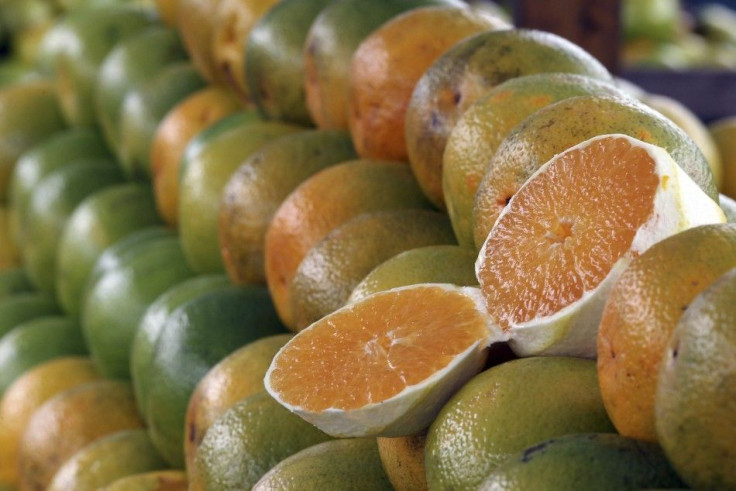FDA Bans Orange Juice Imports; Which Brands May Be Harmful?

The U.S. Food and Drug Administration announced Wednesday that it would temporarily halt all imports of foreign orange juice because of fears of carbendazim traces found in oranges, especially those from Brazil. The import ban will last until the FDA has finished conducting a thorough investigation of carbendazim levels.
The news of the ban comes just one day after it was revealed that the FDA would increase testing for carbendazim, a type of fungicide, after it was found in low levels on Dec. 28, according to Bloomberg News. In a letter to the Juice Products Association on Monday, the FDA said an unnamed juice company contacted it and said low levels of the fungicide were detected in its own orange juice as well as competitors' juice.
Siobhan DeLancey, an FDA spokeswoman who spoke with Bloomberg, said the company has been tracking the compound for several years now.
Fungicides are used to control fungi or fungal spores in agriculture, according to the Huffington Post. Carbendazim in particular was used to kill black fungus on Florida oranges as recently as 2008. However, once studies linked it to increased rates of cancers and infertility, an outright ban of its use on American oranges was soon enacted. Nevertheless, carbendazim is still legal in Brazil, and the European Union allows foods to contain up to 200 parts per billion of the fungicide.
The Huffington Post also reports that an FDA spokeswoman said the unnamed juice company's testing found levels up to 35 parts per billion of the fungicide, despite being far below the EU's maximum residue level of 200 parts per billion. Still, FDA officials said they weren't concerned about the safety of orange juice but would increase testing to make sure the contamination wasn't a problem.
On the other hand, one official, Nega Beru, said the FDA will indeed move forward on measures to take tainted orange juice off store shelves if its testing uncovers unsafe levels of carbendazim. DeLancey said the FDA is also screening orange juice that's already for sale in the U.S. market because some juices are a mixture of imported and domestic juice.
DeLancey also said imported orange juice that tests at carbendazim concentrations of 10 parts per billion or higher will be refused or destroyed.
The overwhelming majority of orange juice consumed in the U.S. is produced from domestic oranges, though Bloomberg reports that Brazil produces almost one in every six glasses of orange juice consumed, according to CitrusBR, an export industry association.
Brazilian orange growers are worried the ban and testing will heavily affect them.
Our main concern is how this move will affect consumption and image of our product, said Flavio Viegas, head of Brazil's citrus growers association Associtrus, which represents about 1,300 orange growers, by phone.
Carbendazim is widely accepted for other crops, including apples, which are consumed fresh. I don't understand what's the deal with frozen concentrated orange juice.
Others aren't worried as much.
Brazilian orange juice is safe and always has been, said Dan Schafer, a spokesman for Coca Cola Co., which owns the Minute Maid brand, in an e-mail. Second, this is an issue that impacts every company that produces products in the U.S. containing orange juice from Brazil.
So, which orange juice brands should you stay away from to avoid carbendazim? The list includes major brands:
- Minute Maid (mix of Florida and Brazilian oranges)
- Tropicana (mix of Florida and Brazilian oranges)
- America's Choice (mix of Florida and Brazilian oranges)
- Tree Ripe (mix of Florida and Brazilian oranges)
© Copyright IBTimes 2024. All rights reserved.





















